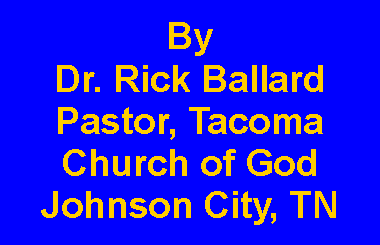

|
For the Church of God Reformation Movement, the issue of biblical authority has always been central to our faith and life. Early in our Movement’s history, F.G. Smith wrote, “The truth of the Bible is determined by its nature; while its authority is dependent altogether upon its source.” The Bible’s source is God Himself, who has all authority (cf. Matt. 28:18; John 12:49; Rom. 13:1). To speak of the Bible’s nature, therefore, is to speak of its divine authority. One cannot separate the Bible from its source (i.e., God) without calling into question its authority, and subsequently its inspiration. The apostle Paul reminded Timothy that “all scripture is given by inspiration of God” (i.e., literally, “God-breathed”—2 Tim. 3:16). In doing so, Paul revealed that he believed that the source and authority of all scripture was God. When we, in the church of God, declare that we have “no creed but the Bible,” what we are in essence saying is that we believe that our sole authority and “rule of faith” is the Bible, and nothing else. We claim this because we understand that God is the source and authority of all scripture.
When describing the nature of biblical inspiration and authority, what terminology we use and how we define that terminology is important. An exhaustive explanation of all the theories of inspiration is not possible in this short article. But there are some familiar expressions that have been employed by the church over the years that help speak to the Bible’s authority. The most common of these expressions have been the terms inspired, infallible, and inerrant. Although these terms are occasionally used interchangeably, they have usually been defined independently of one another. For example, when the church claims that the Bible is “inspired,” it is basically saying that scripture has God as its source. When the term “infallible” is used, it usually means that what the scriptures teach is trustworthy, reliable, and true. The term “inerrant” is a more specific term meaning that the scriptures are without error. Specialized terms like “plenary inspiration” or “verbal inspiration” have also been used to promote the idea that even the words (as opposed to just the overall message) are inspired. Of course, biblical inspiration should not be understood as the elimination of all human involvement. On the contrary, the very idea of inspiration necessitates the inclusion of the human element. As Albert F. Gray said, “It is the person that is inspired [by God] . . . not the papyrus, the pen, or the ink . . . .” This view, sometimes understood as “dynamic inspiration,” takes into consideration the balance between God and man in the producing of scripture.
Still, it cannot be denied that there are questions concerning the nature of biblical inspiration that are not easily answered, like why are Old Testament quotations found in the New Testament sometimes recorded differently? It is a well-known fact that Paul frequently quoted from the Septuagint (i.e., the Greek version of the Old Testament) instead of the ancient Hebrew Masoretic text. Did he do so because he viewed the Greek version as more “inspired” than the Hebrew? It is doubtful that he did. But it is a legitimate question, nonetheless, especially in light of the fact that these two sources are not 100 percent in verbal agreement.
Of all the terminology that has been used to describe the authority and inspiration of the Bible, the idea of inerrancy has been without a doubt the most controversial and debated. Because of this, many have simply wanted to avoid using the term. This has been especially true in the Wesleyan/Holiness movement. One of the reasons for this is the fact that the idea of inerrancy has been closely associated with Calvinism. This “association” has led many within the Wesleyan/Holiness tradition to steer clear of the term. There are others who view inerrancy as a fundamentalist doctrine that is too dogmatic and unreasonable as it relates to the limits of the biblical writer’s knowledge of history and science. Then there is the issue of how inerrancy should be explained and applied. For example, would inerrancy imply that God superseded the biblical authors’ personalities and writing styles? Should the idea of inerrancy include punctuation or Hebrew vowel points, something which the church added to the scriptures centuries after they were written? Also, would we consider translations of the Bible inerrant? If so, which ones? Or do we limit inerrancy to the original manuscripts (i.e., the original documents first penned by the biblical authors, which no longer exist)?
Some have attempted to redefine inerrancy in a way that would avoid these difficulties and include only the thoughts and ideas of the writers. For example, phrases such as “limited inerrancy” and “soteriological inerrancy” have been used to define inerrancy as relating only to those parts of scripture that deal with salvation, while other parts such as history and science are subject to possible miscalculations and/or unintentional errors. The problem here, however, is determining which areas of scripture deal with salvation and which do not. In other words, who has the final authority, or the final word, on the subject?
Those who claim that biblical inspiration must include the idea of total infallibility and inerrancy do so based on the belief that if the Bible contains even one error, then it could not have come from a sovereign, omnipotent God. Wesley himself declared, “If there be any mistakes in the Bible there may as well be a thousand. If there be one falsehood in that book, it did not come from the God of truth.” Still, even a statement as straightforward as this raises the question of whether or not Wesley was referring to the original manuscripts of scripture, or the translations that he personally used (i.e., the Geneva and the 2nd revision of the King James Version, both of which included the Apocrypha). This is why it is important to explain and clarify one’s position and terminology, to help limit confusion on the subject.
A legitimate concern that some have on the issue of inspiration and authority concerns the numerous translations, or versions, of the Bible. Many want to know if the Bible they hold in their hands today (whichever version that happens to be) would qualify as being divinely inspired. The question here becomes, would the transmission of the scriptures into another language still fall under the category of inspiration? This, again, would depend on how we define our terminology. Because of the inconsistencies and transmission errors that are in the ancient copies of scripture that we do possess, and the linguistic difficulties and limitations of translating from one language to another, it is overwhelmingly agreed among scholars that if one is going to maintain the view of total (verbal) inerrancy, it should be restricted to the original manuscripts and not be applied to the transmission and translation of the scriptures. Does this mean, however, that our English Bibles today are not inspired? No. Inspiration without preservation would leave us with no authoritative copy of the scriptures. Biblical inspiration and authority, therefore, must transcend the original manuscripts and include the transmission of those manuscripts. Modern translations of the Bible are inspired to the degree that they faithfully represent the original manuscripts. Since there are over 6,000 early manuscript copies or portions of the Greek New Testament, and another 10,000 or so Old Testament manuscripts and fragments all in existence today, the accuracy of reconstructing the original biblical text is well over 99 percent. What this means is that we can be confident in knowing that the modern translation we own today is divinely inspired, infallible, and authoritative for all matters of Christian faith and practice.
If we are going to claim, as Paul did, that all scripture is “God breathed” (2 Tim. 3:16), then we must have a proper understanding of what that means. A strong belief in the full inspiration of scripture, including the ideas of infallibility and inerrancy, does not warrant the unfounded accusation by some of bibliolatry (i.e., making an idol out of the Bible). Nor does it require belief in the extreme view of divine dictation, where the writers of scripture just unconsciously wrote exactly what God dictated to them, much as a stenographer would in a court room. Furthermore, holding to the idea of full inspiration does not demand the uniformity of all details given in parallel accounts written by different authors (e.g., the four gospels). Neither does it necessitate the absence of symbolism, hyperbole, figurative language, and round numbers. On the contrary, to say that the scriptures are fully inspired is to recognize the authority of the whole of the biblical message, and all the different ways God chose to convey that message. The Bible is called the Word of God because it IS the Word of God. If God’s word is forever settled in heaven (Ps. 119:89), then we should accept its full authority here on earth.
I want to conclude with one final thought. As with all matters of doctrine and theology, we should treat one another with respect and dignity when discussing the subject of biblical inspiration and authority. The fact that there are differing theories and ideas when it comes to this subject should not lead us to judge those who may not agree with us on our terminology or do not use the same Bible translation as we do. Our common ground is that we are all striving to seek the truth, and, as Peter says, “grow in the grace and knowledge of our Lord and Savior Jesus Christ” (2 Pet. 3:18).
1 Smith, F.G. What The Bible Teaches (Anderson, IN: The Gospel Trumpet Co., 1913), p. 29. 2 The Hebrew Masoretic text is the source the Old Testament is based on. 3. The problem here has been what is known as ‘guilt by association’. In other words, many Wesleyan’s feel that any doctrine that is associated with Calvinism must be rejected. But this is a logical fallacy, as there are many doctrines that both Wesleyans and Calvinists hold in common (e.g., the sinlessness of Christ, the Trinity, the fallen human nature, the resurrection of Christ, etc.). This is why each theological issue should be evaluated on its own merit. 4. Biblical Hebrew was originally written only in consonants with no spacing. Vowel pointing (i.e., the adding of vowels) and the separation of words occurred much later, in the middle ages from the 6th – 10th century. 5. Wesley, John. The Journal of John Welsey, 8 volumes, edited by Nehemiah Curnock (London: The Epworth Press, 1938), 6:117. 6. It should be noted that a few modern translations such as Paraphrases, street versions, and novel-based Bibles fall outside the definition of a ‘translation’ and should therefore not be considered as faithfully representing the original manuscripts. 7. If the Latin Vulgate and other early versions are included, there are over 24,000 early copies or portions of the New Testament (and if the quotes by early church fathers are considered, this number doubles). In addition, some of these date only twenty to thirty years from the original manuscripts. 8. To say that translations are infallible is NOT to say that they are without any errors whatsoever. The ideal of a pure, error-free text (i.e., Inerrancy) should be understood as applying to the original manuscripts only.
Christianity is often called a book-religion. It would be more exact to say that it is a religion which has a book. Its foundations are laid in apostles and prophets, upon which its courses are built up in the sanctified lives of men; but Christ Jesus alone is its chief corner-stone. He is its only basis; He, its only head; and He alone has authority in His Church. But He has chosen to found His Church not directly by His own hands, speaking the word of God, say for instance, in thunder-tones from heaven; but through the instrumentality of a body of apostles, chosen and trained by Himself, endowed with gifts and graces from the Holy Spirit, and sent forth into the world as His authoritative agents for proclaiming a gospel which He placed within their lips and which is none the less His authoritative word that it is through them that He speaks it. It is because the apostles were Christ’s representatives, that what they did and said and wrote as such, comes to us with divine authority. The authority of the Scriptures thus rests on the simple fact that God’s authoritative agents in founding the Church gave them as authoritative to the Church which they founded. All the authority of the apostles stands behind the Scriptures, and all the authority of Christ behind the apostles. The Scriptures are simply the law-code which the law-givers of the Church gave it.
--Benjamin B. Warfield, (1851-1921) was Professor of Didactic and Polemic Theology at Princeton Theological Seminary.
|
